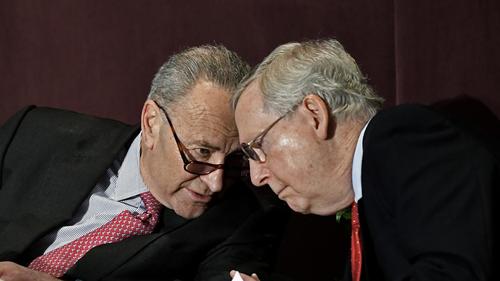Default Averted For Now After Senate Reportedly Reaches Debt-Ceiling Deal
Following negotiations that stretched late into Wednesday evening, Democrats and Republicans have reportedly forged a compromise deal on a short-term increase in the the debt ceiling which will avoid default, but as Bloomberg notes, “threatens to exacerbate year-end clashes over trillions in government spending.”
In moving forward, Democrats appear to be on the verge of accepting a proposal from GOP leader Sen. Mitch McConnell (R-KY) which would raise the debt limit by a specific amount – enough to move things into December, when Congress will have to vote again to avoid a default.
While the details aren’t totally clear, McConnell’s offer was to allow a vote on extending the debt limit at a fixed collar amount – which Goldman’s Alec Phillips expects a number on over the next day or so.
“We’re making good progress,” Senate Majority Leader Chuck Schumer said in early Thursday morning comments from the Senate floor, adding “we hope to have agreement tomorrow morning,” adding that the Senate would come back into session at 10 a.m. Thursday.
That said, this is classic can-kicking which will have consequences down the road, as Democrats will likely attempt to move forward with their massive tax and spending package and separate infrastructure bill while at the same time funding the government to avoid yet another potential shutdown after December 3.
News of a possible debt-ceiling accord stoked the biggest positive turnaround in the equity market in more than seven months, as the S&P 500 Index closed up 0.4% after tumbling earlier. In the bond market, traders bid back up the prices of Treasuries set to mature in the window around a potential default. Investors then moved on to gauge which securities may now be most at risk of a missed or delayed payment under the new congressional timeframe. -Bloomberg
Treasury Secretary Janet Yellen has warned that the US would likely default after October 18 without congressional action. At present, the current debt limit is $28.4 trillion, while the Treasury reported that it had $343 billion in combined extraordinary measures and cash on hand.
As an approximation, during the period from Sep. 29 to Dec. 3, 2019, debt subject to limit (this includes marketable and non-marketable debt) increased by $356bn and the cash balance declined by $50bn, suggesting that the Treasury would use around $400bn in borrowing capacity by early December if cash flows are similar this year. Since the Treasury still had more than $300bn in room under the debt limit at the end of September, a debt limit increase to only $28.5-$28.6 trillion might be sufficient to accomplish the intent of the agreement, but the Treasury will be the final word on this and the amount will depend on expected cash flows this year. -Goldman Sachs
And while a fixed dollar amount (vs. a calendar-based solution) injects a bit of uncertainty as to when exactly the next deadline will hit, the debt deal alleviates concerns which were beginning to reverberate throughout the investment community. Earlier this week, McConnell sidestepped a question over whether any major banks or wall street titans had contacted him over the debt ceiling fight.
It was thought that the investment community would hammer Washington if lawmakers bumbled into a debt ceiling crisis.
Worry started to permeate Washington that rating agencies could downgrade the creditworthiness of the U.S. before Oct. 18 – the deadline when Treasury says the U.S. will run out of cash. –Fox News
Senate Democrats have considered the debt deal a victory – with Sen. Elizabeth Warren (D-MA) exclaiming on Wednesday that “McConnell caved,” adding “And now we’re going to spend our time doing child care, health care, and fighting climate change.”
From here, the focus will undoubtedly return to negotiations over Biden’s fiscal agenda – and in particular, the stalemate within the Democratic party between Senate moderates Joe Manchin (WV) and Kyrsten Sinema (AZ), who have vowed to sink any reconciliation plan that exceeds $1.5 trillion, and House progressives, who will likewise tank the $1.2 trillion bipartisan infrastructure deal unless Manchin and Sinema bend the knee.
Assuming that drags into December, expect fireworks into the end of the year.
Tyler Durden
Thu, 10/07/2021 – 07:35![]()
Zero Hedge’s mission is to widen the scope of financial, economic and political information available to the professional investing public, to skeptically examine and, where necessary, attack the flaccid institution that financial journalism has become, to liberate oppressed knowledge, to provide analysis uninhibited by political constraint and to facilitate information’s unending quest for freedom. Visit https://www.zerohedge.com
